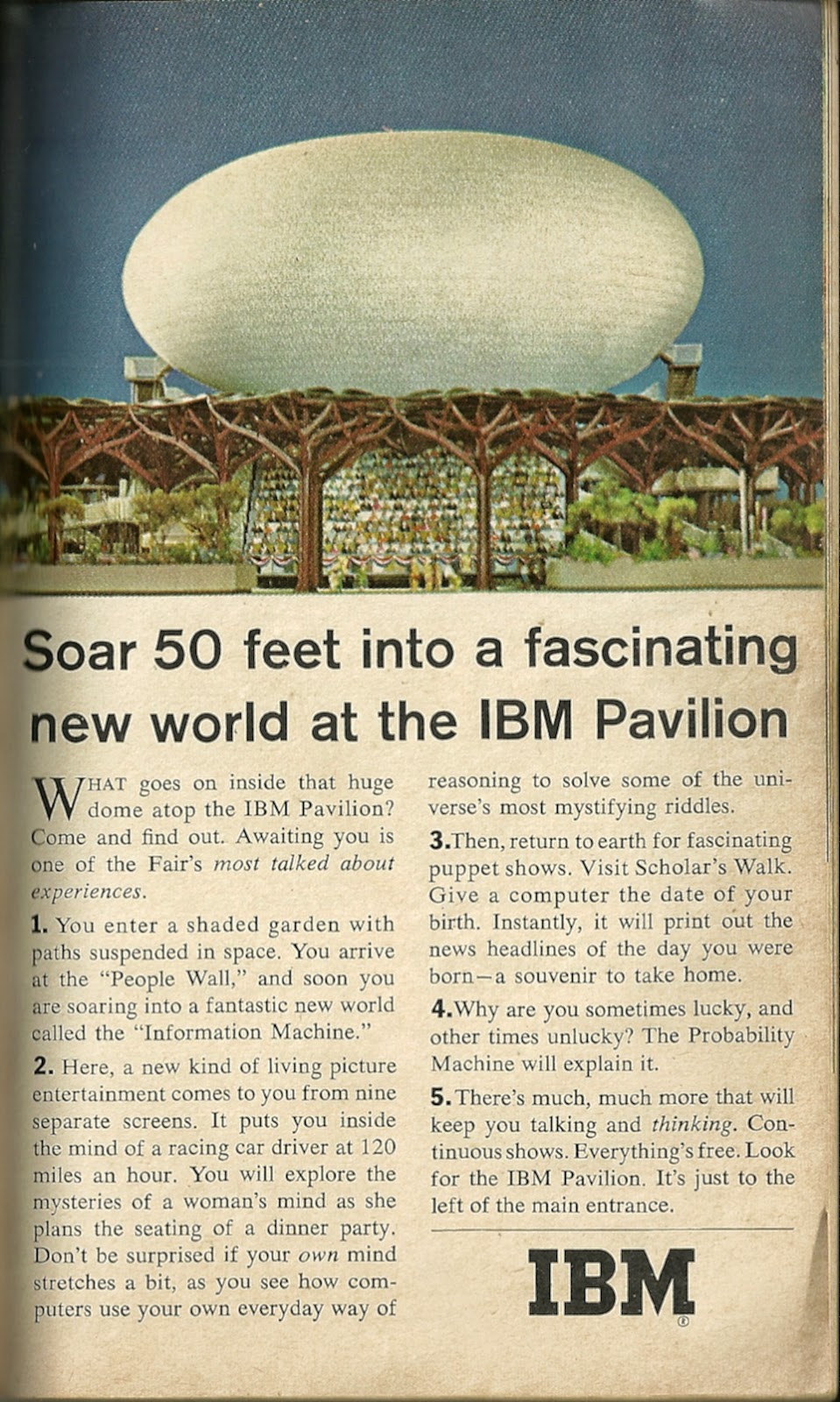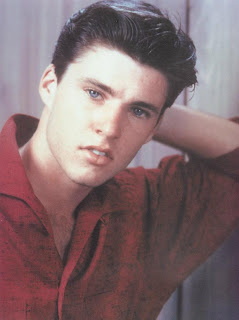Last week one of those anniversaries that media outlets love to note occurred. Network tv stations, as well as various internet outlets, showed about 30 seconds worth of fuzzy film footage before moving on to something else. But that little bit of 'soft news' gave me pause. The warm glow of nostalgia, as fuzzy as the images, began to flow. Yes, I had been there. I had seen. I had experienced. I had lived.
You see, on April the 23rd, it was 50 years to the day since the New York World's Fair of 1964 - 1965 opened. A couple of times, it was referred to as "The World of Tomorrow". That phrase was, we were told, the slogan of the fair and was solemnly intoned while a picture of the Unisphere was shown. Except it wasn't. That was the slogan of the 1939 - 1940 fair, held at the same location. In fact, the symbols of that earlier fair, the Trylon and Perisphere, were in the same exact spot where the Unisphere was built. The Unisphere was the largest model of our planet ever constructed, made out of the finest U.S. Steel. It was at the center point of the fair in a reflecting pool, surrounded by fountain jets of water which reached upward to the sky mirroring our hopes and ambitions for "Peace Through Understanding", the fair's actual motto.
I knew all of this for the simple reason that I was 13 years old and desperate to escape (even for a few paltry hours) from my ordinary little home town in the southern part of New Jersey. This wasn't just a World's Fair, it was a New York World's Fair. Baghdad on the subway. Visions of delightful (but unspecified) decadence floated before my mental eyes like those conjured by the Devil to tempt the Christ during His sojourn in the desert. I knew this for a fact; I had seen the movie.
I managed to get to the fair twice. If memory isn't playing a trick or two to embroider the sense of stultification I was experiencing in my hometown, there was an excursion with the Methodist Youth Fellowship, and a trip with the Boy Scouts. I was that desperate to go. It is a wonder I remember that part at all. I remember the long bus journey there. I remember walking down a seemingly endless boardwalk, through an awning of stylized wings that seemed poised to take off . Without warning, rising from a sea of color, it loomed in front of me, a vision, a dream, a temptation - the Unisphere. I had arrived.

There had been months spent in expectant, torturous, exquisite waiting. My father allowed that he hated New York and would get nowhere near the place, but that as a teenager he had gone to the 1939 fair and loved it. I had already found the jig saw puzzle he had purchased as a souvenir. It was a map of the fair, and was missing pieces. I had still put it together, and fallen in love with the Trylon and Perisphere symbols. After a bit of outright begging, he allowed me to use his 8mm Bell and Howell camera to take movies while I was there. The camera was a little finicky as to settings in strong daylight, so he also allowed me to use his light meter. Weeks later I would discover that the light meter was no longer working properly and the footage of the fair was horribly overexposed. For the 1965 edition, he allowed the use of his new super 8 movie camera, after the requisite repeated begging of course. One of these days I must get those put into digital format. I didn't take still pictures, but I did take slides - with my new Instamatic camera, purchased at Mr. Duper's Hobby Shop on my town's Main Street. The Hobby Shop was next to the storefront that was the Greek's diner where I used to purchase my cherry cokes after the soda fountain at the Rexall was removed. If the place had a real name, I never knew it. Everyone called it "the Greek's", a bow to the ethnicity of its proprietor. It was on such an excursion that I'd noticed the arrival of the new Kodak camera on display in the Hobby Shop window, and began to save my pennies.

When the Kodak pavilion was included in the 50th anniversary news reports, only one mentioned that it displayed the largest color photos made up to that date. No one mentioned that the rest of the building's roof was a futuristic moonscape - with spots which had placards which noted them as being perfect for taking pictures of the fair. Which brings up one other little matter, best illustrated with this commercial:
The reason I wanted to post that is very simple - it is in black and white. So was television then. In fact, it was at the fair's RCA pavilion that color tv was first demonstrated for eager dreamy eyed buyers. (Movies had been black and white, too, with color saved for big budget spectaculars and musicals.) Quite a bit of what has turned up documenting the fair is in black and white, which does it a great disservice. It was the early 60's, the world had become color, and the circus had come to town.
One of the exhibits which fascinated me the most was the IBM pavilion. Floating above what seemed like a sea of metal treetops was a giant egg. I've never been sure what that was supposed to represent, or what meaning was attached to it. Perhaps it was an expression of the Dadaist sensibility inherent in the newly emerging corporate environment. Here's the advertisement for it from my 1964 guidebook to the fair. Notice the color wall in the center - it was row upon row of seats, steeply raked. The wait to sit there seemed like it would take you clear into 1965. After every seat was taken, the wall was raised via hydraulic lifts into the egg where a movie was exhibited on a series of giant screens. It was wonderful.

I no longer remember anything about the movie, just the experience of it. After the wall of people was lowered, the exit took one past something almost unbelievable. It was a machine that ingested cards. One was invited to write a date on a card, and the machine would not only read the handwriting, it would tell you what happened on that date, as per the headlines of the New York Times. I wrote September 7th, 1950. I was born on the 6th, The Times was a morning paper - if it worked, the headline would tell me what had happened on the day I was born. This was no mere sideshow gimmick, this was the future. The device was called a "computer".


Not quite 20 years and a lifetime later would come a particular Christmas. A few years before, I had rebelled against the standard family gift giving of useful socks and ties, to give things that were fun and hopefully enjoyable. That year, my father and stepmother finally gave in and asked me what I would like that was something fun rather than a necessary item. I told them they couldn't afford what I wanted. After all, it cost over a hundred dollars! Amused, they asked what had so caught my imagination. I told them. It was a Commodore 64c computer. The "c" after the 64 meant that it had a display that was in color. After a couple of weeks they called me back and proposed we split the cost - they would pay half, but there would be no other gift that year. I agreed. I've been at it ever since.
There are so many memories of the fair knocking around in my brain, impressions really. But as soon as I see a picture, I can usually tell you what the object was, what pavilion housed it. After the internet got started, I would perform occasional searches for graphics of the fair. I began collecting the few things that turned up of the 1939 version as well as the 64. There was never much to be found. Over the last few years, a number of pictures and You Tube videos have happily appeared. I've long intended to start posting the ones I've collected, and hopefully I'll now follow through.
It was at that fair that I saw visions of the future. It was at that fair that Walt Disney introduced "audio animatronics" (one of Abraham Lincoln stood up and gave a speech!)(and I still have the recording of it), it was at that fair that Ford introduced the Mustang, it was at that fair that I marveled at the exquisite curves and lines of Michelangelo's Pieta and discovered a desire to see art in person rather than in picture books, it was at that fair that I was given a copy of the Book of Mormon, it was at that fair that the world learned the joys of the Belgian waffle, topped with cream and strawberries, it was at that fair that a new type of telephone was on display - you could see the person you were talking to on a tiny screen. Nah, it'd never catch on.
In 1968 I attended college in northern New Jersey, an hour's train ride from New York City. My first excursion was to the Museum of Modern Art to see a silent movie. Train trips are great for reading and pondering. On the trip back from that first day in the city, I finished reading "The Great Gatsby". I closed the cover with a sigh and a great deal of satisfaction. I was only able to afford one year of college. I didn't get the scholarship I needed to continue. I went to Ocean City NJ for the summer, and stayed as I began working to support myself. In the fall of 1972, I moved to Manhattan. It had become the place of my dreams, the center of learning, museums, culture, theatre, music, movies, bookstores, it was where the world of tomorrow was being born. I would live there on a voyage of discovery for 15 years. Somewhere around 1975 or so, I headed out on the subway to a special stop, a park that had once been an ash heap which had featured prominently in "The Great Gatsby". It was all a bit derelict and sad. Here and there patches of grass peeked through barren soil. In the center of the park, in an empty fountain, stood a giant globe made out of steel.

I drifted away, and never went back.
Years later I moved on, "a boat against the current, borne back ceaselessly into the past”.













































